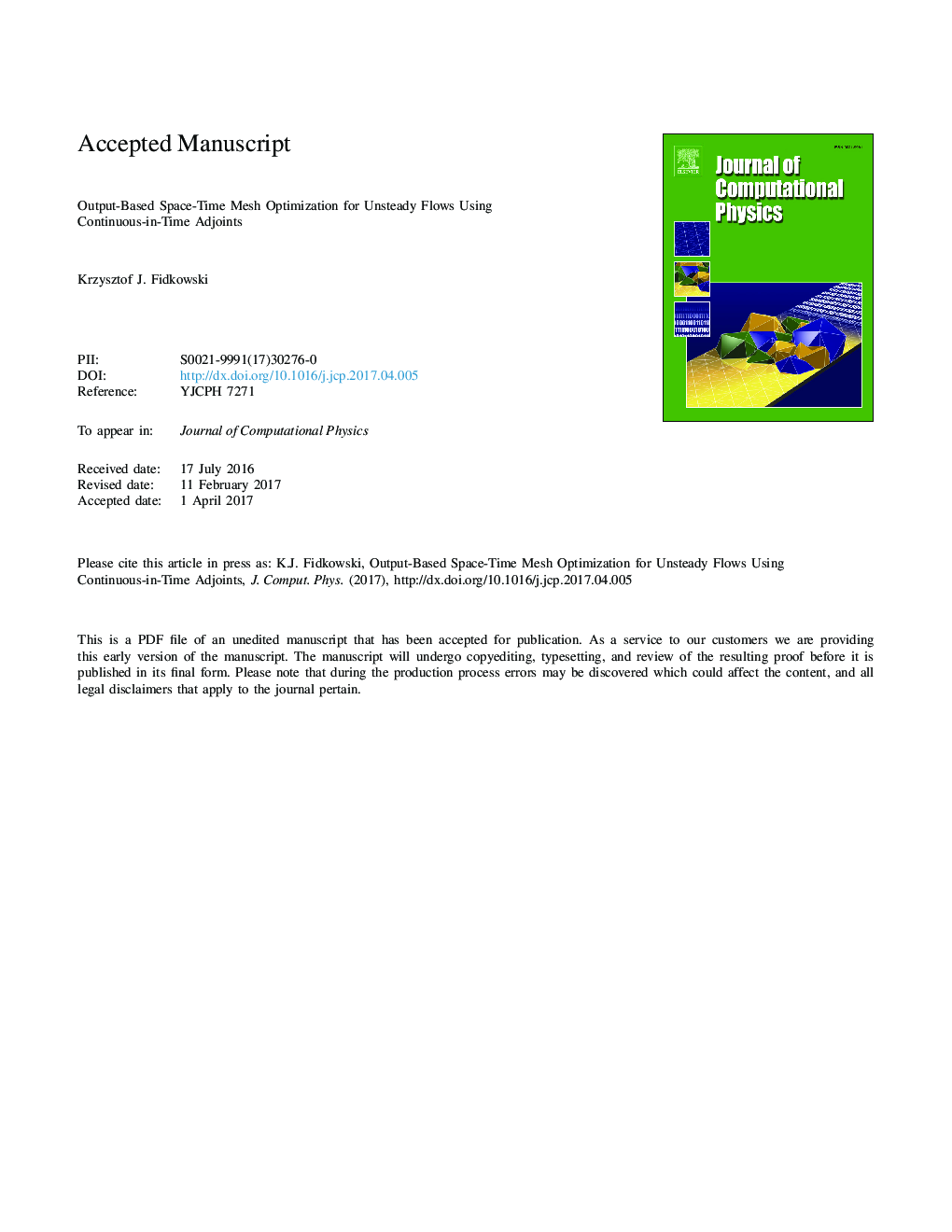| کد مقاله | کد نشریه | سال انتشار | مقاله انگلیسی | نسخه تمام متن |
|---|---|---|---|---|
| 4967377 | 1449372 | 2017 | 24 صفحه PDF | دانلود رایگان |
عنوان انگلیسی مقاله ISI
Output-based space-time mesh optimization for unsteady flows using continuous-in-time adjoints
ترجمه فارسی عنوان
بهینه سازی فضای زمان با استفاده از خروجی برای جریان های غیرمتعارف با استفاده از اتصالات مداوم در زمان
دانلود مقاله + سفارش ترجمه
دانلود مقاله ISI انگلیسی
رایگان برای ایرانیان
کلمات کلیدی
گارکین متزلزل، برآورد خطای خروجی، پیوسته مداوم، انطباق نامتقارن، بهینه سازی مش،
ترجمه چکیده
ما یک روش برای تخمین خطاهای عددی فضایی و زمانی را در خروجی های اسکالر شبیه سازی دینامیک مایع غیرمتعارف با استفاده از راه حل های پیوسته متصل در زمان و روش های همگانی زمان ارائه می کنیم. فرمول مداوم تفکیک زمانی اولیه و همسایگی را جدا می کند و اجازه می دهد تا برای استفاده از طرح های زمانبندی استاندارد برای همسایگی استفاده شود. برای روش های غیر متنوع، یک بازه زمانبندی عددی تکراری از راه حل های اولیه و متناظر جایگزین نمایندگی کاربردی بین گره های زمان می شود. خطای خروجی هنوز از طریق یک باقیمانده باقیمانده باقیمانده محاسبه می شود که شکل انتگرال فضا-زمان را می گیرد. برآورد خطاهای زمانی و مکانی جداگانه از پیش بینی اتصال به فضاهای نیمه تصفیه شده به وجود می آید. این برآوردها مستلزم پالایش انطباقی هستند که برای اولین بار نیاز به محاسبه توزیع مناسب هزینه بین تمایز فضایی و زمانی دارد. مکانیک انطباق شامل یکپارچگی / هماهنگی یکنواخت موقت و تعدادی از پدیده های مکانی محلی است: انطباق سفارش، تکمیل گره حلقوی و بهینه سازی مش ساختار. نتایج برای اعمال نفوذ افتراقی اسکالر و برای معادلات ناجی-استوکس فشرده شده نشان دهنده اثربخشی برآوردهای خطا، کارایی پالایش انطباق، استقلال شبکه های بهینه شده تا مشعل شروع و اهمیت تقریب های فضایی و زمانی بالا است.
موضوعات مرتبط
مهندسی و علوم پایه
مهندسی کامپیوتر
نرم افزارهای علوم کامپیوتر
چکیده انگلیسی
We present a method for estimating spatial and temporal numerical errors in scalar outputs of unsteady fluid dynamics simulations using continuous-in-time adjoint solutions and general time-integration methods. A continuous formulation decouples the primal and adjoint temporal discretizations and allows for the use of standard time-integration schemes for the adjoint. For non-variational methods, a scheme-agnostic temporal reconstruction of the primal and adjoint solutions replaces the functional representation in between time nodes. The output error is still estimated through an adjoint-weighted residual, which takes the form of a space-time integral. Separate temporal and spatial error estimates arise from projection of the adjoint to semi-refined spaces. These estimates drive adaptive refinement, which first requires a calculation of the appropriate cost distribution between the spatial and temporal discretizations. The adaptive mechanics consist of uniform temporal refinement/coarsening, and several localized spatial refinements: order adaptation, hanging-node refinement, and unstructured mesh optimization. Results for scalar advection-diffusion and for the compressible Navier-Stokes equations demonstrate the effectivity of the error estimates, the efficiency of the adaptive refinement, independence of optimized meshes to the starting mesh, and the importance of high-order spatial and temporal approximations.
ناشر
Database: Elsevier - ScienceDirect (ساینس دایرکت)
Journal: Journal of Computational Physics - Volume 341, 15 July 2017, Pages 258-277
Journal: Journal of Computational Physics - Volume 341, 15 July 2017, Pages 258-277
نویسندگان
Krzysztof J. Fidkowski,
